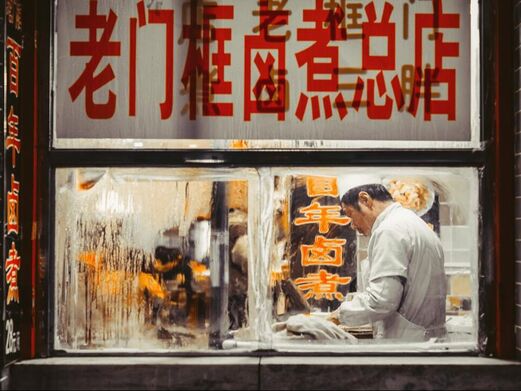|
My father was a pharmacist who formulated his own cough medicines, syrups for various ailments, and creams for an assortment of skin conditions. Once a month he went to New York City’s Chinatown to buy herbs, tinctures, and spices that he used to make the preparations. After he bought what he needed he would go to a small local restaurant and eat lunch. When he told me the menus were in Chinese and the waiters spoke no English, I asked, “How do you know what to order?” “I don’t,” he said. “When I come in, they give me food.”
“But how do they know who you are?” “The man from the herb and spice shop wrote the restaurant owner a note.” “What did it say?” My father shrugged. “I couldn’t read the Chinese writing. I think it was something about me being a good customer who liked to eat good food.” It all sounded tremendously exciting to my ten-year-old self. A restaurant where you can’t read the menu, and you can’t ask the waiter to explain what something means, and you can’t decide what you want to eat? Imagine! A restaurant where food is served with no choice or explanation? “But when the waiter brings you food, how do you know what you’re eating?” “I don’t,” he admitted. I was totally intrigued. I wanted to go. I kept begging him, with no success, to take me with him. He told me he didn’t want me to embarrass him by not eating what they brought. For him, this was the end of the conversation. For me, it was the beginning. My urge to go with him was working overtime and I wasn’t about to accept his no. After every month’s visit I would barrage him with questions: What did he eat? What did it taste like? What did he do if he didn’t like what they served him? How did he know what to pay? What was it like to go to a restaurant where he was the only person who wasn’t Chinese? I knew when he’d gone because he came back with new spices, herbs, and tinctures for my mother to use in cooking and baking, but I didn’t know ahead of time when he would go so I couldn’t ask in time. Each month my desire to go with him grew. Years before, when I’d gone with my parents to eat in a foreign restaurant and balked at eating something strange, my mother had admonished me, “Nancy, don’t you want to be cosmopolitan? Eat!” I didn’t know what cosmopolitan meant then, but it sounded like something I should be. I ate. Although up to now, nothing I said changed my father’s mind, I remembered my mother’s words. When I thought it might be close to the time he would be going for his monthly visit to Chinatown, I said, “Dad, don’t you think you should let me go with you? Don’t you want me to be cosmopolitan?” He shook his head. “Nancy, you never give up, do you.” I promised I’d eat whatever the waiter brought. I promised I’d be good, whatever that meant. I was ready to promise whatever I needed to promise. Finally, he agreed to take me the next time he went. The shop where he bought the spices, herbs, and tinctures was a feast for the senses. Smells and shapes and colors—all labeled with lettering I couldn’t read. My father and the owner used a lot of words I’d never heard, making decisions by pointing, smelling, and tasting. The owner gave me a bit of sugar cane, with a sparkle in his eye, which I guessed meant it was a treat. It smelled terrible and tasted worse, but I remembered my promises and pretended to love it. I began to wonder what I’d let myself in for if this was a taste of what was to come. As soon as we were outside, while my father talked to the shop owner, I threw the sugar cane into a waste bin, hoping no one saw me. We entered the restaurant, barely bigger than our kitchen at home, I hoped the food would taste as good as the delicious smells that welcomed us. There were four tables, three with people crowded together, sitting on mismatched chairs. A waiter came with napkins and chopsticks and sat us at the last empty table. Within minutes he brought us plates of steaming food, none of which I recognized. My father looked sternly at me. I nodded. I had never seen or used chopsticks before but I managed to copy what my father did. I noticed the other people put food into a bowl filled with rice and brought it up to their mouths so I did the same. What a relief! So much easier than bringing food from my plate to my mouth using chopsticks that kept wiggling out of my grip. The food was hot, spicy, and mostly delicious, although I had to force myself to eat something gelatinous that threatened to come back up. I kept it down by drinking a cup of hot tea that was continuously refilled. When we finished, the waiter took our plates, nodding approvingly, then brought dessert, which I thought was a sweet bun. I bit into in and by sheer dint of will, kept from spitting it out. Whatever was in it was sour and tasted awful, but this too I managed to finish. When the meal was over, the waiter brought the bill with the numerical amount my father had to pay. Numbers are universal I guess. The waiter put his hand on my shoulder and asked, “Velly good?” “Velly good,” I responded. My father paid. The waiter came back with a stick of sugar cane, a big smile on his face as he gave it to me. I smiled the best smile I could muster and said, “Thank you.” We left the restaurant, me trying to ditch the sugar cane without my father noticing. I felt like I’d been in a foreign country yet I’d never left the city in which I was born. That night he told my mother how well I’d behaved. “Can I go next month?’ He nodded. Thereafter, I was his lunch companion for the next few years. Surrounded by people who looked, dressed, talked, and ate foods that I’d never seen or eaten was a continuing adventure like no other I’d experienced, a time to accept what was new and strange without judgment. Are you cosmopolitan?
2 Comments
Marlene Simon
11/5/2022 01:42:51 pm
Another example of what a risk-taker you are and you're willingness to put yourself in strange and uncomfortable situations to learn and grow. I love that even though you didn't like everything you tried, it did not dissuade you from returning over and over again. There is a theme here!
Reply
Leave a Reply. |
Monthly StoriesStories inspired by world tales to challenge and comfort. Archives
July 2024
Categories |
Copyright © Nancy King 2020 | Site Design by Angulo Marketing & Design
|
|
Nancy King is a widely published author and a professor emerita at the University of Delaware, where she has taught theater, drama, playwriting, creative writing, and multidisciplinary studies with an emphasis on world literature. She has published seven previous works of nonfiction and five novels. Her new memoir, Breaking the Silence, explores the power of stories in healing from trauma and abuse. Her career has emphasized the use of her own experience in being silenced to encourage students to find their voices and to express their thoughts, feelings, and experiences with authenticity, as a way to add meaning to their lives.
|


 RSS Feed
RSS Feed